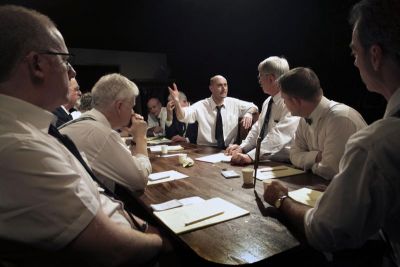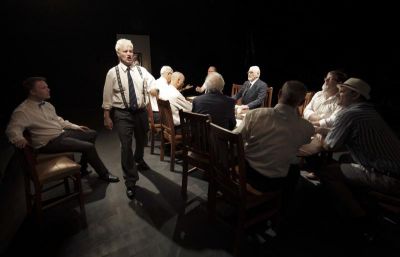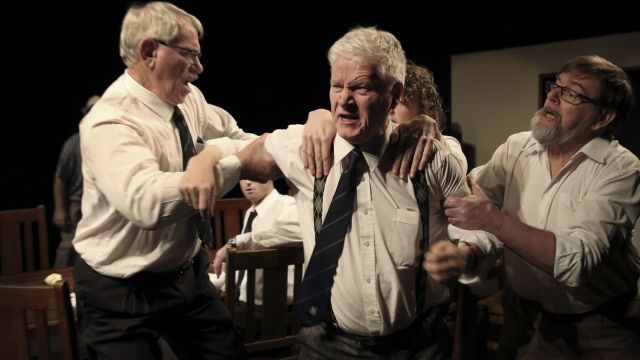12 Angry Men
It takes a quality production to win over a critic who goes in harbouring doubts over the quality of the text being performed. MBM’s 12 Angry Men, despite its flaws, is a quality production.
For those unfamiliar with the premise, these 12 in question are jurors, presiding over an American murder trial. The men are not named, only numbered. An accused boy’s life hangs in the balance, and they must all come to an agreement before he can be either freed – or condemned…
This reviewer remains somewhat sceptical about the writing of Reginald Rose, but despite elements of artificiality, and moralising that is clunky by today’s standards, there is plenty here that still provides useful food for thought. Commentary about the legal system is the strongest aspect of the text, while its examinations of human nature and fallibility, though tending to score less consistently, manage to be valid and interesting on the whole.
 Byrne’s ensemble cast – naturally including himself – is a richly talented one, with any weaknesses vastly outweighed or otherwise compensated for. Rohan Richards is an effective presence as the guard, and though the establishing voice of the trial judge was about 80% incomprehensible on opening night, once the performers start filling the jury room on stage, the range of nuance and revealing interaction is so finely tuned that one is drawn in effortlessly, almost without a word.
Byrne’s ensemble cast – naturally including himself – is a richly talented one, with any weaknesses vastly outweighed or otherwise compensated for. Rohan Richards is an effective presence as the guard, and though the establishing voice of the trial judge was about 80% incomprehensible on opening night, once the performers start filling the jury room on stage, the range of nuance and revealing interaction is so finely tuned that one is drawn in effortlessly, almost without a word.
Standing out, in both manner and dress, is James Black in a vivid characterisation that skilfully enhances the atmosphere rather than distracting from it. Director Byrne has shrewdly cast the less substantive roles with actors – James McCluskey-Garcia, Angus Smith, Nathan Quadrio, Russell Ford, and Sam Davy amongst them - who are visually striking, physically expressive, and who know how to communicate a lot with a little. Davy brings a particularly welcome comedic element to his dialogue.
James Whitrow’s juror is like a coiled snake who strikes regularly to shock and intimidate the room, disdaining the need for attention to detail even in a life-or-death situation such as this, while Neville Phillis makes his European character a natural, engaging, warmly ingratiating one, as well as another source of the play’s humour (“I’m simply asking questions” is a moment of exquisite eloquence). David Haviland is quietly commanding when he takes his turn in persuading the jurors around him, and John R. Sabine’s seniority creates a useful level of texture and conflict, despite the performer’s accent of uncertain origin.
 The reveal of David Grybowski as the initial dissenting juror is an effective surprise, and the actor’s approach to this pivotal character is unexpected, somewhat offbeat, and rather refreshing, with none of the sparkling saintliness that Henry Fonda’s film portrayal tended to communicate. Juror no. 8, though idealistic, is also a pragmatic, analytic, determined everyman, not a sentient angel, and Grybowski has the talent and charisma to make this play an absorbing experience, even for those who’ve not been fully won over to it in the past.
The reveal of David Grybowski as the initial dissenting juror is an effective surprise, and the actor’s approach to this pivotal character is unexpected, somewhat offbeat, and rather refreshing, with none of the sparkling saintliness that Henry Fonda’s film portrayal tended to communicate. Juror no. 8, though idealistic, is also a pragmatic, analytic, determined everyman, not a sentient angel, and Grybowski has the talent and charisma to make this play an absorbing experience, even for those who’ve not been fully won over to it in the past.
Byrne is not always able to reign in and modulate his own performance appropriately, resulting in passages where excessive volume is used in an attempt to hold the attention and generate drama, with only mixed success. His choice of a short passage from Adagio for Strings to open the second act seems puzzling and thoroughly unjustified, though thankfully it is played at only moderate volume.
The jury system, not to mention the justice system in general, must always be critically examined on a regular basis; so must prevailing beliefs that may be based purely in prejudice. These are among the reasons why a work like 12 Angry Men still has something to say to audiences. Though not flawless, this is a commendable staging of a thoughtful work by a formidable ensemble.
Anthony Vawser
Subscribe to our E-Newsletter, buy our latest print edition or find a Performing Arts book at Book Nook.

